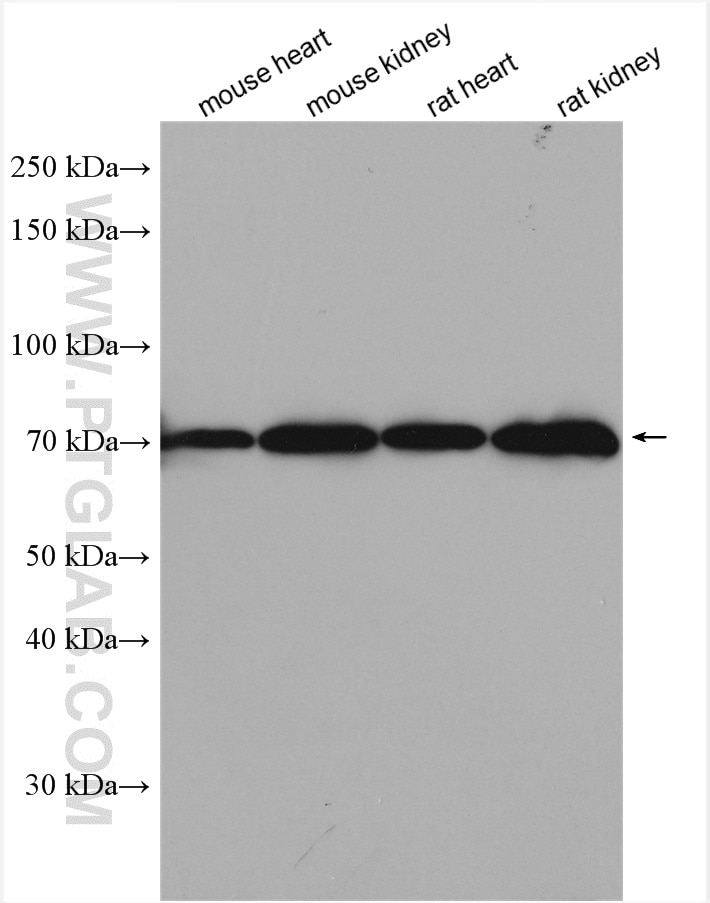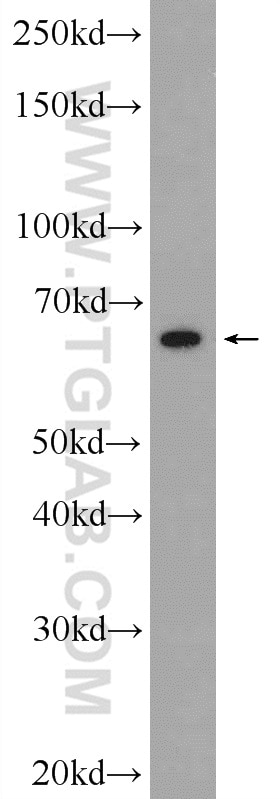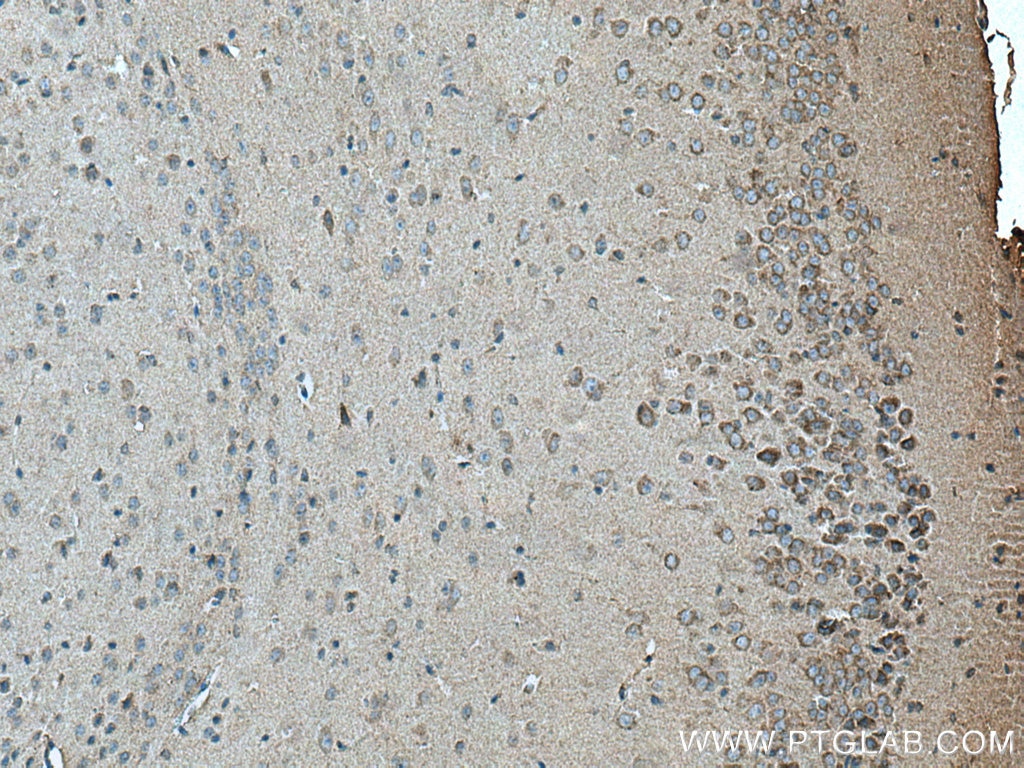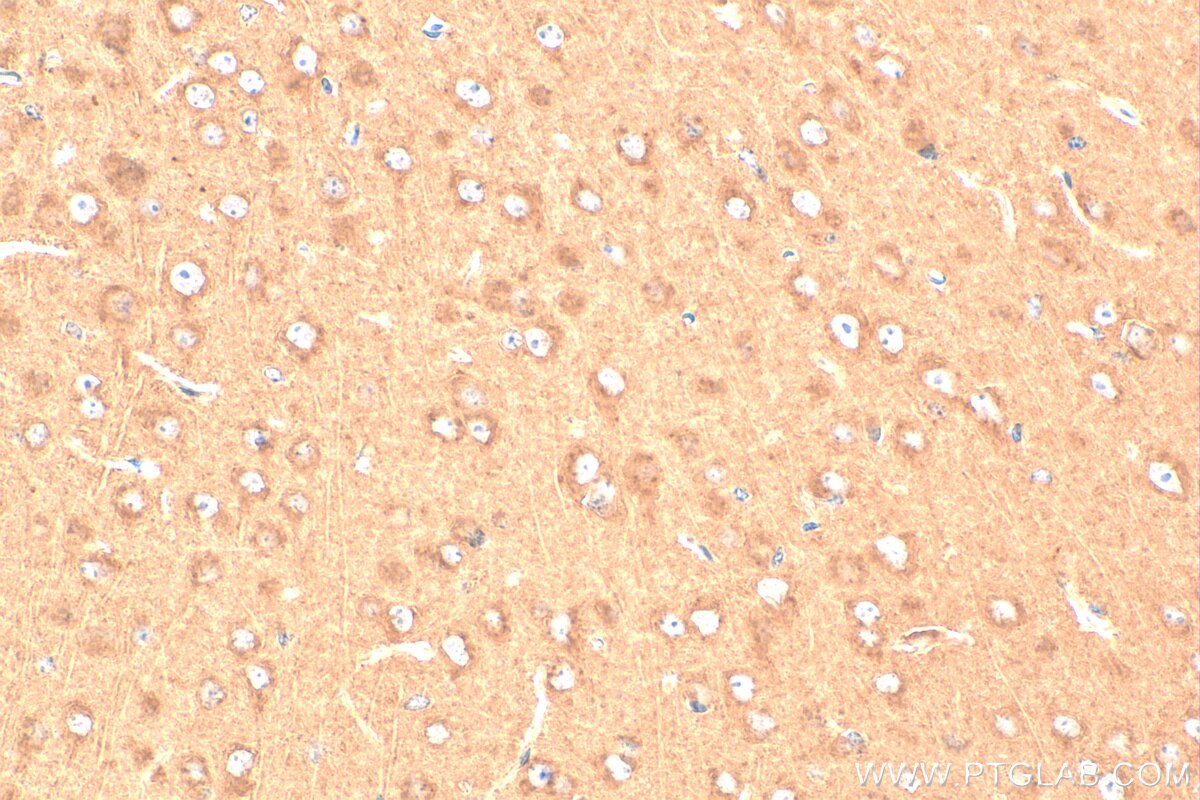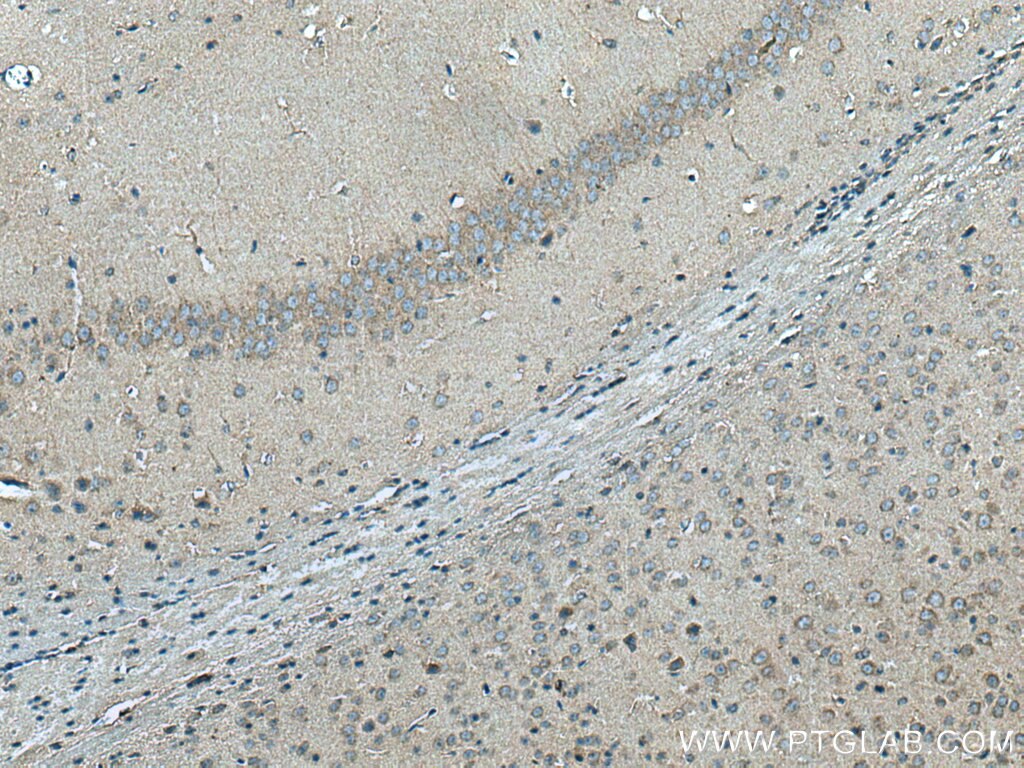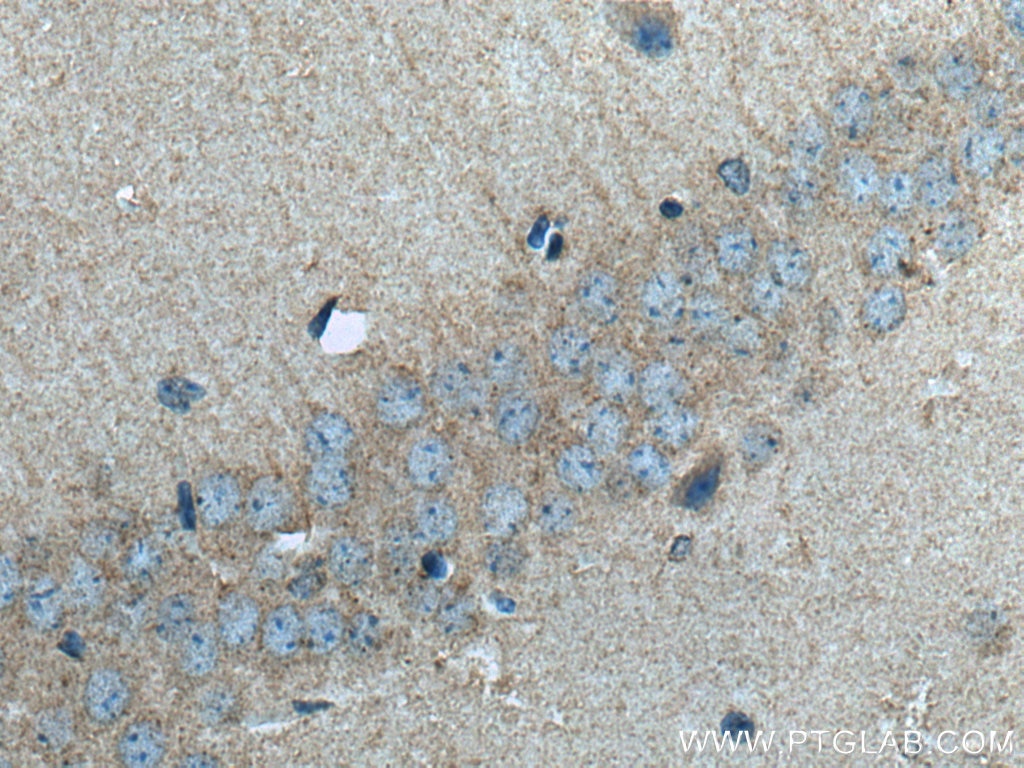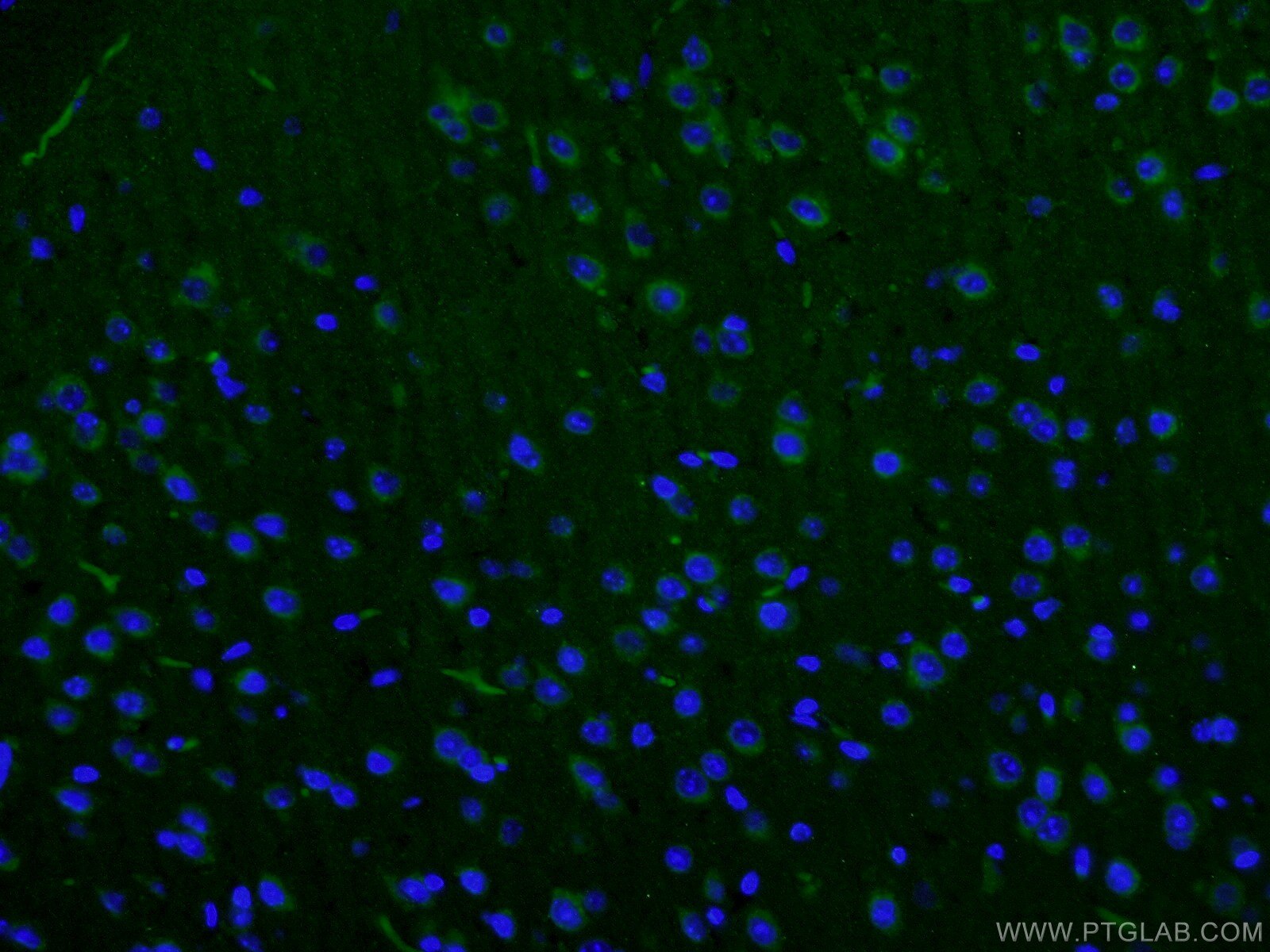Tested Applications
| Positive WB detected in | mouse heart tissue, HUVEC cells, mouse kidney tissue, rat heart tissue, rat kidney tissue |
| Positive IHC detected in | mouse brain tissue Note: suggested antigen retrieval with TE buffer pH 9.0; (*) Alternatively, antigen retrieval may be performed with citrate buffer pH 6.0 |
| Positive IF-P detected in | mouse brain tissue |
Recommended dilution
| Application | Dilution |
|---|---|
| Western Blot (WB) | WB : 1:300-1:1000 |
| Immunohistochemistry (IHC) | IHC : 1:50-1:500 |
| Immunofluorescence (IF)-P | IF-P : 1:50-1:500 |
| It is recommended that this reagent should be titrated in each testing system to obtain optimal results. | |
| Sample-dependent, Check data in validation data gallery. | |
Published Applications
| KD/KO | See 2 publications below |
| WB | See 10 publications below |
| IHC | See 8 publications below |
| IF | See 7 publications below |
Product Information
20299-1-AP targets SLC6A8 in WB, IHC, IF-P, ELISA applications and shows reactivity with human, mouse, rat samples.
| Tested Reactivity | human, mouse, rat |
| Cited Reactivity | human, mouse, rat, bovine |
| Host / Isotype | Rabbit / IgG |
| Class | Polyclonal |
| Type | Antibody |
| Immunogen |
CatNo: Ag14110 Product name: Recombinant human SLC6A8 protein Source: e coli.-derived, PGEX-4T Tag: GST Domain: 541-635 aa of BC012355 Sequence: YYEPLVYNNTYVYPWWGEAMGWAFALSSMLCVPLHLLGCLLRAKGTMAERWQHLTQPIWGLHHLEYRAQDADVRGLTTLTPVSESSKVVVVESVM Predict reactive species |
| Full Name | solute carrier family 6 (neurotransmitter transporter, creatine), member 8 |
| Calculated Molecular Weight | 635 aa, 71 kDa |
| Observed Molecular Weight | 65-70 kDa |
| GenBank Accession Number | BC012355 |
| Gene Symbol | SLC6A8 |
| Gene ID (NCBI) | 6535 |
| RRID | AB_2878665 |
| Conjugate | Unconjugated |
| Form | Liquid |
| Purification Method | Antigen affinity purification |
| UNIPROT ID | P48029 |
| Storage Buffer | PBS with 0.02% sodium azide and 50% glycerol, pH 7.3. |
| Storage Conditions | Store at -20°C. Stable for one year after shipment. Aliquoting is unnecessary for -20oC storage. 20ul sizes contain 0.1% BSA. |
Background Information
SLC6A8, also known as the sodium- and chloride-dependent creatine transporter 1 (CT1), plays a critical role in transporting creatine, a crucial molecule for energy metabolism, into cells. SLC6A8 belongs to the solute carrier family 6 (SLC6), responsible for transporting diverse molecules across cell membranes. SLC6A8 expression is highest in muscle, kidney, and other tissues with high energy demands. Mutations in SLC6A8 cause creatine transporter deficiency, an X-linked mental retardation disorder (PMID: 17465020).
Protocols
| Product Specific Protocols | |
|---|---|
| IF protocol for SLC6A8 antibody 20299-1-AP | Download protocol |
| IHC protocol for SLC6A8 antibody 20299-1-AP | Download protocol |
| WB protocol for SLC6A8 antibody 20299-1-AP | Download protocol |
| Standard Protocols | |
|---|---|
| Click here to view our Standard Protocols |
Publications
| Species | Application | Title |
|---|---|---|
Sci Adv Glioblastoma exploits ATP from leading-edge astrocytes to fuel its infiltrative growth revealed by spatially resolved chimeric analysis | ||
Front Oncol Long Non-Coding RNA AL513318.2 as ceRNA Binding to hsa-miR-26a-5p Upregulates SLC6A8 Expression and Predicts Poor Prognosis in Non-Small Lung Cancer. | ||
J Agric Food Chem Artepillin C, a key component of Brazilian propolis, induces thermogenesis in inguinal white adipose tissue of mice through a creatine metabolism-related thermogenic pathway. | ||
Ann Transl Med SLC6A8 is involved in the progression of non-small cell lung cancer through the Notch signaling pathway.
| ||
Technol Cancer Res Treat SLC6A8 Knockdown Suppresses the Invasion and Migration of Human Hepatocellular Carcinoma Huh-7 and Hep3B Cells.
|
Reviews
The reviews below have been submitted by verified Proteintech customers who received an incentive for providing their feedback.
FH Nusrat (Verified Customer) (12-12-2025) | The Ab works well with porcine and Rb cell lines.
|

